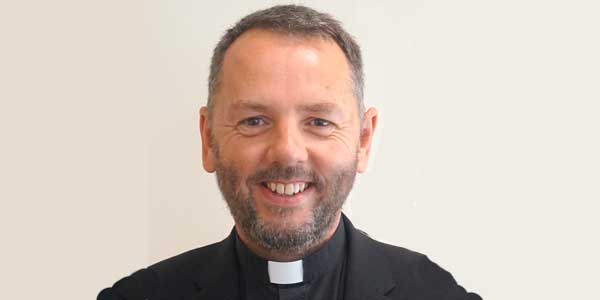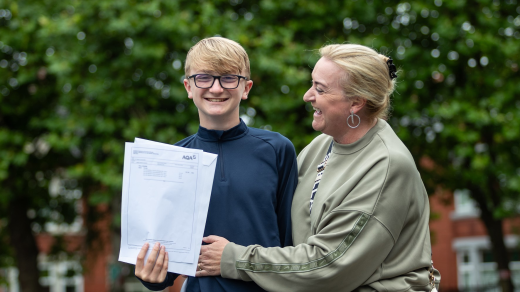Revd Richard Peers, Diocese of Liverpool’s Director of Education

With over 30 years of experience working in education, including both primary and secondary schools, Revd Richard Peers was the unanimous choice to take over the Diocese of Liverpool’s Director of Education role. With his passion for social justice and promoting the values of Christian education, his ambition is to create “more success for more children”.
Bold ambitions
by Hannah Fowler
It was a parish priest, who was also a priest-headteacher, who ignited Richard Peers’ passion for teaching. Richard recalls how, as a teenager, the priest inspired him to train as a teacher and he hasn’t looked back since. “Education has been part of my whole life,” he says. “I live and breathe education and I am constantly fascinated by the process of learning and how we nurture children and young people as well as offering lifelong learning for adults.”
After training at King Alfred’s College in Winchester, Richard taught reception for the first years of his teaching career before becoming deputy head of a primary school. It was during this time that Richard was also ordained as a priest and he has since spent time in numerous school chaplaincy roles.
Before taking up his new post in September, Richard was executive head at Trinity All Through CE School in Lewisham, a role which he says was challenging but exciting as he oversaw a complete re-build and name change of the school. The last two SIAMS (Statutory Inspection of Anglican and Methodist Schools) inspections reflect Richard’s strong leadership, as the school was judged as ‘outstanding’. It was from here that he sought a new challenge – and saw the opportunity at the Diocese of Liverpool.
The Director of Education oversees all the work of the education department at the Diocese of Liverpool and supports 119 primary and secondary schools and academies across the North West region. The team takes on a wide range of matters including support for governors and headteachers for senior appointments, SIAMS inspections to curriculum development and building support.
It’s a complex and demanding role but one that Richard can’t wait to take on. “I hope that I can build on the excellent practice of our schools to ensure that when children leave them they are committed to building a better world and that they are young people who are glad to be alive and glad to be able to make a difference.”
Richard’s enthusiasm for learning and Christian education shines through, as does his emphasis on nurturing good relationships in classrooms. He says: “I believe all institutions – no matter how large or small – function well when the systems, routines and procedures are in place so everyone is safe and when the relationships are generous and kind. I think it is almost impossible to have too high expectations of children. Relentlessly wanting the best and expecting the best of children allows them to be and do the best.”
The vision of the Diocesan Board of Education seeks to ‘ensure that through its Church schools and academies it offers children and young people a high quality education’. Richard believes the Board is in a unique position to facilitate school to school support and ensure this vision comes to fruition.
“Relentlessly expecting the best, defining what the best looks like and searching for the reasons why children don’t achieve the best is the way to ensure high quality for everyone. The diocesan family of schools is an opportunity for schools to share good practice and ensure that every school is good or better.”
So what is the secret to a successful school? “When I asked Sir Daniel Moynihan (chief executive of the Harris academies) what the secret of success was his answer was quite simple: information,” says Richard. “We need to know what is happening in schools and monitor it closely to see where interventions and support is needed. Technology is our friend in this area and the education team will be working to develop the best possible systems for monitoring what is happening in schools.”
While Richard acknowledges the challenges and changes facing the education sector, he has confidence in church schools’ ability to respond and adapt. “Church schools benefit from the continuity that the church offers and also from the connections between church schools, locally, nationally and even internationally,” he says. And when it comes to inspiring the next generation of school leaders, Richard is positive that Liverpool will lead the way.
“Our national and international connections are invaluable in ensuring that our schools are not just successful but leading other schools. Identifying the dynamic leaders of the future and successful succession planning and leadership training will ensure high quality leadership in all our schools. The Church of England’s national Education Office is piloting a Church of England Professional Qualification for Headship in Liverpool and in two other regions. I am determined that Liverpool will pilot many such projects and lead the way in the Church of England.”
Speaking to Richard, his ambitions are clear, “Too many children underachieve in schools,” he says. “My ambition is to create more success for more children and to ensure that our schools break cycles of poverty and create social mobility for the largest possible number of children. Church schools are profoundly inclusive communities, challenging stereotyping and prejudice of every kind.”
Already working in harmony with the Diocese of Liverpool’s Bigger Church, Bigger Difference philosophy, Richard’s parting words read as a mission statement for education leaders everywhere.
“We need to make a difference for the pupils in our schools but even more than that I hope that the young people who leave our schools will be world-changers themselves. They will be enraged by injustice and determined to change it. They will be involved in politics and active in their communities. They will seek to craft lives that are not simply about earning and material gain but service of others. They will recognise the joy of sacrificial living, of living for others and not for themselves, and this will have been modelled to them by the sacrificial giving of their teachers and everyone committed to Christian education.”




